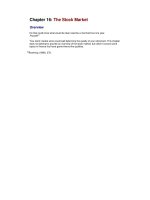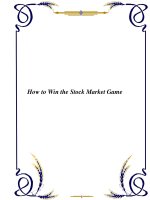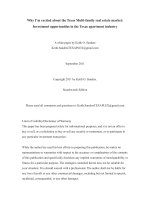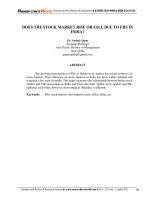What I Really Think about the Stock Market
Bạn đang xem bản rút gọn của tài liệu. Xem và tải ngay bản đầy đủ của tài liệu tại đây (192.69 KB, 26 trang )
16
171
What I Really Think
about the Stock
Market
Because I’m not on anyone’s permanent payroll, I am free to tell you
what I really think about the stock market. You don’t have to agree with
what I say—in fact, I welcome opposing viewpoints. There is no one
right answer when it comes to the stock market. In the end, you should
make up your own mind where to invest your money.
Listen to Traders, Not Investors
If you want to hear the truth (no matter how painful it is), listen to short-
term traders who are in cash by the end of the week. Because traders
don’t care whether the market goes up or down, they are usually more
objective about the direction of the market.
In contrast, most long-term investors are perpetually hopeful that
next year or in 5 years the market will be higher. This includes anyone
who works on Wall Street or is heavily invested in the market. These
CHAPTER
10381_Sincere_04.c 7/18/03 10:58 AM Page 171
Copyright © 2004 by The McGraw-Hill Companies, Inc. Click here for Terms of Use.
people will almost always tell you that the markets are going nowhere
but up. For the sake of their portfolios, I hope they are right, but hope
never made anyone a dime in the market. (To be fair, however, I have
also listened to my share of blowhard day traders, who think they are
geniuses right before they destroy their account.)
Keep a Lot of Cash
In an irrational world, holding cash makes you think rationally, espe-
cially if we’re headed toward a recession or a bear market. Even in a
bull market, keep a little cash on the side. When you hold cash, you
know that you can pay your bills and take care of any unexpected emer-
gencies. In addition, in the event of a crash or economic crisis, your
cash will allow you to invest at bargain prices.
When you have diversified into cash, you aren’t affected by the
daily gyrations of the market. Also, when the market is ornery and
you’re unsure of what to do, cash is the best place to be until you make
up your mind what to invest in. In my opinion, even a 4 percent annual
return is better than losing money. As I said in a previous chapter, mak-
ing money should be boring. Holding cash is about as boring as it gets.
Psychology Makes the Market Go Round
I’m convinced that the emotions of other investors and traders deter-
mine where the market is headed. Most investors and traders agree that
in the short term, investor psychology has a dramatic effect on the mar-
ket. That is why technical analysis, which measures market sentiment,
tends to work over short periods.
At the height of the last bull market, the overall perception was that
the good times would last forever, even to the point where bad news
was spun on Wall Street as being positive. For example, although many
Internet companies consistently reported negative earnings, people bid
their prices up higher in the anticipation and hope that future earnings
would improve. People continued to buy in the hope that many compa-
nies (especially Internet and telecommunications companies) would
see substantial profits.
172
U
NDERSTANDING
S
TOCKS
10381_Sincere_04.c 7/18/03 10:58 AM Page 172
As you can guess, for the first 3 years of the subsequent bear mar-
ket, the reverse occurred. People stopped paying attention to the market
to the point where they refused to look at their account statements.
Even when a company released positive earnings, the stocks often
dropped in price or remained unchanged. In general, people refused to
participate in the market.
You need to understand the importance of psychology in the mar-
ket in order to look for clues that will lead you to profitable investment
opportunities as well as to take steps to protect yourself from losing
money. This means being aware of what is happening in your city, the
country, and the world.
The next bull market will begin when investors are so disgusted
and afraid of the market that they’ve lost all hope that it will ever
recover. There will be numerous signs that the market is rallying, but
only a handful of people will be savvy enough to connect the dots.
Don’t Trust Earnings Estimates
I can’t tell you what a company will earn in the next quarter, let alone
the next year. There is no way you can tell me that a company is going
to be profitable in 5 or 10 years. It amazes me that people act as if they
know for a fact how much a company is going to earn in the future. In
the past, we depended on accounting firms to certify that the numbers
coming from companies were truthful. Once we discovered that there
was a conflict of interest between the accounting firms and the audited
companies, we couldn’t believe anyone’s numbers. We’re hoping that
Wall Street, the accounting firms, and CEOs will give us numbers that
we can trust in the future. Until then, let the buyer beware. (It takes
extraordinary intuition and information to find out what is really going
on behind the scenes at many companies.)
Use Both Technical and Fundamental Analysis
Nearly every book written on the stock market assumes that you will
choose between technical and fundamental analysis when deciding
WHAT I REALLY THINK ABOUT THE STOCK MARKET
173
10381_Sincere_04.c 7/18/03 10:58 AM Page 173
what stocks to buy. Guess what? You can use both methods. If you are
an investor, you can learn a lot by looking at a stock chart, using tech-
nical indicators, and looking at stock patterns. At the same time, you
should not buy a stock unless you are convinced that the company’s
fundamentals are strong. No matter which method you use, you don’t
want to overpay for the stock.
By using both fundamental and technical analysis, you can study
both the company and its stock price. Although there are advantages
and disadvantages of using either method, in the end, you have to
decide which works best for you. By learning both technical and fun-
damental analysis, not only will you become a more knowledgeable
investor or trader, but you will also have more tools in your toolbox.
This could give you an edge over other market participants. Rather than
choosing one method or the other, be eclectic.
Losing (a Little) Money Can Be Educational
One of the worst things that happened to many people during the last
bull market was that they got the idea that it was easy to beat the mar-
ket. Before they had a chance to cash in their winnings, most of their
profits had disappeared. If you lose money in the stock market (or in
any other financial endeavor), turn this event into an educational expe-
rience. Losing money has a number of benefits:
1. It forces you to analyze what you did wrong. Determine whether
the strategies you (or your financial adviser) are using are on the
right track.
2. It tests your character. If you crunch keyboards or throw things
around when you lose money, you had better change investment
strategies. Successful investing and trading is not supposed to be
exciting—the pros take their gains and losses in stride.
3. It forces you to be disciplined. Everyone always talks about the
importance of discipline, and there’s nothing like losing money to
make you realize that you lack it. You failed to limit your losses
or protect your winnings.
174
U
NDERSTANDING
S
TOCKS
10381_Sincere_04.c 7/18/03 10:58 AM Page 174
4. It forces you to take action. When you lose money in the market,
you have a choice: You can keep repeating the same mistakes,
or you can find out what you’re doing wrong. You learn nothing
if you ignore the truth. If you find out what you’re doing wrong,
you always have a chance to get it right the next time.
Get Your Finances in Order
In my opinion, you shouldn’t consider investing in the market until
you’ve taken care of some other important details. Here are a few ideas:
1. The first investment you should make is in your home.
2. After buying a house, buy a mutual fund. This will give you a
taste of how the stock market operates. If you have a chance to
open up a 401(k) or an IRA, do so. Earning tax-free money can
eventually make you wealthy.
3. If you have any money left over, invest a portion in the stock
market.
4. Your lifelong goal should be to reduce or eliminate debt. It’s
amazing how quickly your money grows when you are not tied
down with unwanted debt, like credit card bills and car payments.
(I don’t even like mortgage payments, but you had better speak to
a tax adviser before making that move.)
Buying and Holding Isn’t for Everyone
In my opinion, you should not simply buy a stock and hold it indefi-
nitely. For over 60 years, investors have been brainwashed into using
this simple but ineffective strategy. Let’s try to understand why buy and
hold is so popular.
First, there has been a massive public relations campaign by Wall
Street to lure people into buying and holding stocks. If the market is
going up, you buy because you could miss out on the next bull market.
If the market is going down, you buy because stock prices are so cheap.
WHAT I REALLY THINK ABOUT THE STOCK MARKET
175
10381_Sincere_04.c 7/18/03 10:58 AM Page 175
When the public invests in the market, it keeps people on Wall
Street employed. That is why so few pros advise you not to buy stocks.
And if you’re not buying, hardly anyone will advise you to sell. Sell a
stock? Are you kidding? It will always come back one day, they say.
Even now, people are buying and hoping that their portfolios will
miraculously come back to even by the time they retire. Many of them
will be in for a huge shock.
In the 1990s, it seemed so easy to pick winning stocks. Many advo-
cates of buy and hold point to the successful record of billionaire investor
Warren Buffett. What the experts fail to tell you is that Buffett almost
never buys the stocks of technology companies, has the skill to take apart
and analyze a balance sheet and the patience to stick it out for the long
haul, and is willing to wait indefinitely until he gets the price he wants.
Unfortunately, it’s not easy for people to emulate Buffett. They don’t take
the time to do the necessary research, they get too emotional about their
stock picks, and they get lured into buying the wrong stocks. They’d be
better off in a mutual fund that beats both bear and bull markets.
The Market Doesn’t Always Go Up
Nearly everyone connected to Wall Street says that the average yearly
return on the stock market for the last 60 years is 11 percent (one of the
reasons why you should buy and hold forever). The one fact they forget
to tell you is that the stocks in nearly all the stock indexes are routinely
shifted to make room for more profitable companies. The indexes
remove companies that have gone bankrupt, no longer meet the index
requirements, or no longer reflect the index’s philosophy. In fact, most
major indexes make dozens of changes to their listings each year.
If you want to get really picky, of the original Dow 12 stocks in
1896, only General Electric remains in the index. The other companies,
such as American Tobacco and U.S. Leather, either went out of business
or merged with other companies. I guess you could say that it’s any-
one’s guess how much the market has really gone up or down in the last
100 years. As many people have learned the hard way, buy and hold
fails miserably in a bear market. In addition, even if the market goes up,
that doesn’t mean that your stocks will.
176
U
NDERSTANDING
S
TOCKS
10381_Sincere_04.c 7/18/03 10:58 AM Page 176
The Markets Are Not Fair to Individual Investors
If you are going to participate in the stock market, you have to know the
truth: The markets are not fair to individual investors. To learn what
really happens on Wall Street, read former SEC Chairman Arthur
Levitt’s book Take on the Street: What Wall Street and Corporate Amer-
ica Don’t Want You to Know (Pantheon Books, 2002). It is an inside
look at what happens behind the scenes on Wall Street, including polit-
ical maneuvering, manipulation, lies, distortions, and other schemes
designed to keep individual investors in the dark. Many of the worst
offenders are company insiders and Wall Street players, including stock
analysts, who have access to information that they aren’t willing to
share with individual investors. The insiders know how to maneuver
around the rules.
Martin Weiss, author of The Ultimate Safe Money Guide (John
Wiley & Sons, 2002), mentions a number of outright fraudulent activi-
ties that some companies engage in: padded sales reports, misreported
options, fake analyst ratings, and stockbrokers who attempt to swindle
clients.
In my opinion, the biggest game of all is trying to convince people
that the markets are fair and equitable and that everyone has an equal
chance to make money. Some people who are connected to the financial
markets attempt to manipulate the markets by passing out false email
messages, posting fake messages in Internet chat rooms, calling gullible
strangers on the phone, and going on television to pump up a stock.
Others, such as institutional investors or professional traders, will
buy or sell huge numbers of shares in a single day just to fool the pub-
lic into thinking that there is a “rally” or a “correction” in the stock.
When the public reacts accordingly, these investors do the opposite.
Of course it doesn’t have to be this way. It will take a combination of
government intervention (including a stronger and well-financed Securi-
ties and Exchange Commission), politicians who are willing to stand up
to Wall Street’s special interests, and investors who are unwilling to par-
ticipate in a rigged game. Until the market is truly fair, individual
investors would be advised to be careful. It will take a long time before
many people will trust the markets again. (Perhaps Wall Street likes it
WHAT I REALLY THINK ABOUT THE STOCK MARKET
177
10381_Sincere_04.c 7/18/03 10:58 AM Page 177
that way. If the markets are too dangerous for individual investors, you
have no choice but to give your money to the professionals.)
Not Everyone Should Invest in Individual Stocks
Although I believe that people should learn everything they can about
the market (which is why I wrote this book), overall I think that most
people should be cautious about buying or selling individual stocks. I
know this is an unusual conclusion after writing a book about stocks.
(And believe me, I know this is not a popular position to take!) In my
opinion, there are many less risky things to do with your money than
investing it directly in the stock market. It’s an extremely tough game to
master, and only a few actually succeed at it.
I think that many individual investors don’t have the time, the
knowledge, or the discipline to buy individual stocks. You can’t just buy
a stock and go to sleep. You have to closely monitor individual stocks,
and, unfortunately, most people don’t have the opportunity to do that.
There are many hidden pitfalls that make investing in the stock
market risky. Until the markets are truly fair for the individual investor,
which isn’t likely to happen anytime soon, my advice is to be very wary
about investing directly in the market. The risks are too great. (This will
change when the stock market environment is as fair for individual
investors as it is for large investors.)
That doesn’t mean, however, that you shouldn’t be paying attention
to the market. The time will come when out of all the chaos a fair, trust-
worthy, and investor-friendly market will be created. When the time is
right, you might consider investing in individual stocks. Until then,
learn everything you can about the market, but don’t participate until
you fully understand the risks and rewards.
And Yet There Are Exceptions
On the other hand, I don’t want to discourage those who feel that they
can win the stock market game. If you are excited by the stock market
and feel that you can make money at it, by all means, set aside a small
178
U
NDERSTANDING
S
TOCKS
10381_Sincere_04.c 7/18/03 10:58 AM Page 178
amount of money and give it your best shot. You don’t need a fortune to
make a fortune in the market. (I know a female trader who turned
$5000 into $500,000 during the bull market.) Even if you make only a
couple of hundred dollars a week in the market, the lessons you’ll learn
will be priceless. As long as you are aware of the risks (that you could
lose all your money), go ahead and take a chance. I still stand by what
I said earlier: Most people should not buy individual stocks (although
buying mutual funds makes sense for many people). Perhaps you’re not
like everyone else (after all, you’re reading a book about a subject that
many people are avoiding).
A Trading Strategy That Works
Now that we nearly at the end of the book, I’m going to do something
different. I’m going to reveal a sophisticated stock trading strategy that
works in both bull and bear markets. It’s likely that you’ll never use the
strategy, and you certainly won’t use it at first, but understanding how
it works may give you an inside look at how some traders attempt to
beat the market.
The trading strategy I’m about to reveal could help you to make a
lot of money, far more than the price of this book. It’s so simple that it
will amaze you, although you must be aware that it’s controversial.
There are a lot of professionals on Wall Street, including many money
managers, who have done everything in their power to prevent people
from using it. It goes against everything that Wall Street has been
preaching for 200 years.
This strategy was discovered by an acquaintance of mine who
worked at a midsized company. I was surprised to see his portfolios
double and triple, easily beating the returns of nearly every mutual
fund. His biggest mistake: A few years ago, he taught the successful
strategy to other employees. Before long, half the employees in the
company were using the system, disrupting work and annoying those
who didn’t participate (there’s nothing more frustrating than watching
coworkers make more money than you). Eventually, the company he
worked for refused to let him use the strategy.
Finally, this strategy is not for beginners. To use it, you must mon-
WHAT I REALLY THINK ABOUT THE STOCK MARKET
179
10381_Sincere_04.c 7/18/03 10:58 AM Page 179
itor the U.S. and international markets closely and make last-minute
decisions that could cost you a lot of money if you’re wrong.
How the Strategy Works
The strategy is simple: When the U.S. markets are up a lot (approxi-
mately 1 percent or more), you move your money from a mutual fund
money market account into an international fund. More often than not,
the foreign markets (primarily Europe and Asia) will follow the U.S.
markets. It is estimated that foreign markets follow the U.S. markets
about two-thirds of the time or more.
The strategy works because of the way mutual fund companies price
their funds. Instead of updating the net asset value (NAV) of a particular
fund the next day, mutual fund companies price their funds on the basis
of the previous day’s close, called “stale” pricing. The strategy works
because of the time difference between U.S. and foreign markets—what
some might call a loophole. The 6-hour difference between U.S. and
European markets allow you to arbitrage the funds (take advantage of
the inefficiencies in their prices). According to critic Jason Zweig of
Money magazine, “It’s like knowing tomorrow’s news today.”
The strategy is known by a variety of names, including time-zone
trading, market timing, and in-and-out trading. Gary Smith, author of
How I Trade for a Living (John Wiley & Sons, 1999), briefly wrote
about similar fund trading strategies. However, very few people are
aware that the strategy works most efficiently in a 401(k) or 403(b).
Although mutual fund companies have been aggressive about stopping
people from trading mutual funds in taxable accounts, many have
allowed 401(k) and 403(b) plan participants to continue to use this
strategy. To my knowledge, no one has ever revealed this secret.
The Rules
1. You begin with a company-sponsored 401(k) or 403(b) tax-
deferred savings plan. The beauty of using the strategy in such a
plan is that your gains are tax-free. (Although this strategy also
works using a regular taxable account, most mutual fund compa-
nies penalize you for using market-timing tactics.)
180
U
NDERSTANDING
S
TOCKS
10381_Sincere_04.c 7/18/03 10:58 AM Page 180









